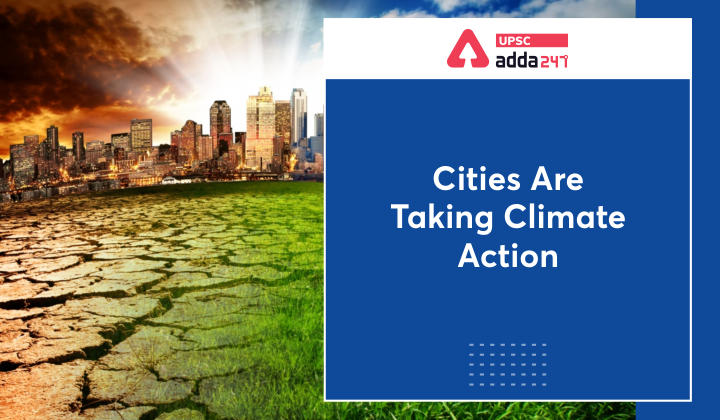Table of Contents
Cities and Climate Action- Relevance for UPSC Exam
- GS Paper 2: Government policies and interventions for development in various sectors and issues arising out of their design and implementation.
- GS Paper 3: Environment- Conservation, environmental pollution and degradation
Cities and Climate Action- Context
- Recently, the Maharashtra government announced that 43 cities across the State will join the UN-backed ‘Race to Zero’ global campaign.
- ‘Race to Zero’ campaign aims to create jobs while meeting goals of climate change and sustainable development.
Failing on Food- Status of Malnutrition in Children and PM POSHAN Scheme
Cities and Climate Action- Issues faced by Indian Cities
- Multiple risks: Cities often face risks on multiple fronts like floods, drought, sea-level rise to name a few.
- Inadequate policy actions by Indian cities: abysmally inadequate policy action on climate-resilient development by Indian Cities.
- Sectoral and isolated policy approach: According to a study conducted in 53 Indian cities with a population of over one million –
- About half of these cities report climate plans, i.e., they have a climate resilience plan or set of projects in place.
- Of these, 18 cities have moved beyond intention to implementation.
- But a lot of these interventions are being implemented through sectoral projects focusing on particular, isolated risks.
- For example, Coastal flooding, sea-level rise, and cyclones are discussed less often despite India’s long coastline and highly vulnerable coastal cities and infrastructure.
- This focus tends to overlook how multiple risks converge and reinforce each other- for example, seasonal cycles of flooding and water scarcity in Chennai.
Bureaucracy’s Digital Challenge
Cities and Climate Action- Model Indian Cities
- Ahmedabad’s Heat Action Plan (HAP): being implemented since 2010, resulting in reduced heat mortality. It has also been scaled up to 17 cities across the country.
- Participation: It involves key government departments, NGOs, researchers and citizens.
- Focus area: focuses on high-risk social groups like wage labourers, low-income groups, women and the elderly.
- Holistic policy approach: it combines infrastructural interventions (for example, painting roofs white) and behavioural aspects (building public awareness on managing heat).
- Nature-based solutions: taken up by states such as mangrove restoration in coastal Tamil Nadu and urban wetland management in Bengaluru.
- For example, urban parks provide cooling benefits and wetlands regulate urban floods.
A scheme before its time- National Digital Health Mission
Cities and Climate Action- Associated Challenges
- Inadequate finances and political will at city scales: these are often cited as the major constrain of developing sustainable Indian cities.
- Inadequate Institutional Capacity: in existing government departments to reorient ways of working.
- This would entail moving away from looking at risks in isolation and planning for multiple, intersecting risks.
- Twin challenges of climate change and inclusive development: this is especially relevant for cities or cities-like villages as India is becoming increasingly urbanized.
Cities and Climate Action- Way forward
- Undertaking long-term planning: This needs resilience planners in every line department as well as communication channels across departments to enable vertical and horizontal knowledge sharing.
- Focus on changing behaviours and lifestyles: This is the most difficult as well as ignored challenge because the norms we adhere to, the values we cherish, and the systems we are familiar with tend to stymie change.
- Promoting Bottom-up sustainable practices: It is a slow but steady behavioural change approach.
- For example, urban farming where citizens are interpreting sustainability at a local and personal scale.
- This can mean growing one’s own food on terraces and simultaneously enhancing local biodiversity;
- Composting organic waste and reducing landfill pressure;
- Sharing farm produce with a neighbour, bringing communities closer and creating awareness about food growing.




 TSPSC Group 1 Question Paper 2024, Downl...
TSPSC Group 1 Question Paper 2024, Downl...
 TSPSC Group 1 Answer key 2024 Out, Downl...
TSPSC Group 1 Answer key 2024 Out, Downl...
 UPSC Prelims 2024 Question Paper, Downlo...
UPSC Prelims 2024 Question Paper, Downlo...
